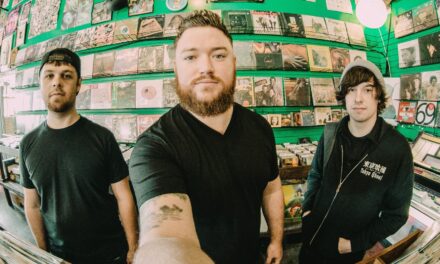“Growing up means watching my heroes turn human in front of me,” The Wonder Years’ vocalist Dan Campbell sang on their 2011 track, “Hoodie Weather.” At the time, the band was freshly signed to Hopeless Records, and that track appeared on their label debut, Suburbia I’ve Given You All and Now I’m Nothing. The Wonder Years were still really just breaking through, and that specific lyric itself came from their admiration for New Found Glory, and going on tour with them and seeing the humanity behind your idols, as Campbell has explained in the past.
It’s not about losing respect for your idols, though undoubtedly that is a risk when you get the chance to meet those you idolize and respect most. However, that wasn’t the case with this particularly instance for Campbell and the band. There’s no real he nor the band could have predicted ultimately what came next, which was a flip of the script so to speak. Suddenly, The Wonder Years became idols to their loyal and growing fan base. People were getting tattoos, lining up to meet them after shows, paying for meet and greets. They quickly — and rightfully so — became one of the defining bands of the 2010’s for this alternative music scene.
Perhaps what’s most impressive about The Wonder Years, is they never let up. They continued to do what they were known for, which — at the time — was really writing fast, energetic pop-punk songs that meant something more than just the stereotypical break-up, disdain towards ex, and so forth. They weaved in raw, complicated emotions and mixed them in with songs that would get their crowds moving from start to finish during their live performances.
Even as the band matured musically with the records to follow Suburbia, 2013’s The Greatest Generation, 2015’s No Closer to Heaven, and 2018’s Sister Cities, they never quite lost that knack and innate ability to connect with their listeners and hit them, at times, where it hurt most. Campbell and his bandmates — consisting of Matt Brasch, Casey Cavaliere, Mike Kennedy, Josh Martin, and Nick Steinborn — have always allowed themselves to wear their hearts on their sleeve, and lay it all on the line.
So as they’ve grown, so have much of us. As they sing about new experiences, pain, love, most of us as the listener have grown up with them, and began experiencing many of these same things as well. This has allowed for fans of the band to feel precisely how The Wonder Years felt with getting to know New Found Glory, that you are watching and listening as this band you idolize constantly humanize themselves, and write in such a way that you feel like you really get what they’re going through in each song, and they get you, too.
With their new record, The Hum Goes On Forever, however, The Wonder Years have dialed that up to a new level. It’s impressive for a band 17 years into their career to write their best record, as it’s not all that common. But, with The Wonder Years, they did so while offering us their feelings, fears, doubts, and love all on a subject that is brand new for them: parenthood.
Not every listener of the band, of course, is going to be a parent as they listen to this record. Much like not everyone was 26 when in 2013 on “Passing Through a Screen Door” Campbell sang about, well, being 26 and the fear that he is behind on life when compared to his peers. But also just like that song in the specific age you are was irrelevant, while The Hum Goes On Forever is unequivocally about Campbell’s new journey into parenthood, it’s written in such a graceful and beautiful manner that you can relate to those feelings. The feeling of unrivaled love and a duty to protect the thing you love and cherish most — everyone can feel that.
To fully dive into where Campbell was at, mentally speaking, when writing this record, it all starts with the title itself. The phrase “The hum goes on forever,” originally was written for a poem he wrote for Sister Cities, and represents two things. Chatting with me a few weeks ago on the phone, he breaks this down. First, there’s the literal sense, “When you’ve done the thing that we do for so long, your ears kind of get fucked up.” But beyond that, it touches on sadness and depression. “It’s allegorical of the sadness for the people that are affected in the way that I am affected, and probably for most people that are reading this are affected,” he begins to explain, “The sadness that is ever present and just, you know, sometimes louder and sometimes quieter, but something that we live beside.”
That “hum,” as Campbell tells me was notably quieter than it had been for quite some time. He explains there were, of course, bad days — describing it as day to day, but if there were to be an average, it was quieter than it had been in the past. He describes there was a shift right after his first son was born in 2019, after the immediate emotions of joy and happiness came, something darker after.
“All of the sudden, you start to look at the world differently. It looks a lot scarier when you are charged with someone’s safety and happiness,” Campbell explains. “And also when you have kids, at least for me, these traumas that maybe you experienced in life that your brain had partitioned off for your own safety, those partitions get thinner. Light starts to leak through the cracks maybe a little bit.”
This is immediately represented on The Hum Goes On Forever, with Campbell singing on the opening track “Doors I Painted Shut”:
“I don’t wanna dieOr maybe I do‘Cause everything’s so fucking darkYou found me crying in the other room”
The wrestling with the notion of wanting to die, Campbell explains to me the distinction in what he was feeling, in that he didn’t necessarily want to die as much as he just wanted existence as a whole to cease entirely. Kicking off the record with this song, specifically, serves as the unquestionable tone-setter for the journey we go on listening to the record, but certainly represents the journey Campbell himself went on while grappling with all of these complex feelings and emotions.
“At the beginning of the record, the question or the statement or whatever, is like ‘Man, wouldn’t it be easier if this was over? If the sun swallowed the earth and I didn’t have to think about any of this shit anymore,” he says. “Then, by the end of the record, whether the conclusion is easier or not, I need to be here because this is my purpose now to protect you to keep you safe and to ensure your happiness. Like, that’s what it is. That’s the reason I’m here, it’s the reason I want the world to be better.”
Campbell explains to me though, that while this was certainly a very personal journey for him, it isn’t one he walked alone. He undoubtedly had a supportive group around him in his bandmates of 17 years, his wife, and a therapist. Because as he mentioned before, he may have gotten this “hum” to be quiet for now and focus more on the joy in life and being there to watch his two children grow up, it doesn’t mean it will always be that way.
“What it means for me, when you need it go to therapy. Take your SSRI. Do the cognitive behavioral things that were taught to you. If those are failing, call your therapist and build a new plan,” he tells me of how he has gotten the place he is now. “It means doing your best. Also understanding that not every day you will be capable of doing these things, and [another] piece of the puzzle is understanding that steps 1 and 2 aren’t going to be possible every day. You just gotta try again tomorrow. You don’t just let yourself go under. If you can’t pull it off on Monday, try again on Tuesday.”
Another notable part of the journey of this record is the track “Lost In the Lights.” I tell Campbell that this is perhaps my favorite song on the new record, and it seems to be a lot of people are also feeling that way — at time of publication, the song was number two on their most popular songs on Spotify. It’s a song that is both nostalgic and reflective, with some appreciation sprinkled in for good measure.
Of course, there’s the Anthony Bourdain reference in the lyrics, which Campbell says is twofold. First, he references Bourdain’s own documented difficulties with being in the spotlight, “Part of it is about the pressures of spotlight, and how difficult it can be to be a public figure mentally, ” he begins, “It’s difficult when one of your peers is gone. When you saw a lot of ourself in them, it becomes more difficult.”
The second reason for the reference is, well, it sounds better. “It’s better to say ‘It’s newly summer and Tony Bourdain died ‘than like ‘The year is 2018’ — it’s just a very uncreative way of setting the setting. So here’s a whole way that you know when the song is being written, when I’m processing these thoughts without me telling you.”
For Campbell, what he’s specifically reflecting on in the song, is his own career. He acknowledges that he knows The Wonder Years are closer to the end of their career Than they were the beginning. He is quick to state he doesn’t know when that end will come, but states “This is year seventeen [of the band], I don’t have seventeen years of this left in me.”
Rather than negatively dwell on such a revelation, or be bitter that you know the end is coming sooner than it ever has, he chose to be feel gratitude. Thus, the line of “What if the magic’s gone / I guess I should be glad there was any at all” was born. Campbell tells me he and the band are acutely aware that The Wonder Years reached heights many bands that they came up with had also dreamed of, and many since have tried and maybe not succeeded. Yet, The Wonder Years has done it all: multiple top twenty records, touring around the world, endless sold out shows, and even critical acclaim.
It’s an impressive feat in any circumstance, and even more so when you remember the time that The Wonder Years were coming up and rising the ranks. It was 2010, and Tumblr was at it’s peak of popularity. You couldn’t scroll that website for 5 minutes without seeing a lyric or some post about The Wonder Years, Man Overboard, Transit, Fireworks, A Loss for Words, etc. There was a frenzy of signings (Rise Records scooped up Transit, A Loss for Words, and Man Overboard all in one for example) and it felt like, to me, there was no room for all of those bands to be successful, but The Wonder Years pulled it out.
Campbell, though, disputes the notion that there was not enough room for everyone to succeed, and instead challenges that “I don’t think any of those two bands would tell you the same story as to why they aren’t playing right now.” That is also undoubtedly true, as it’s easy to understand the other commitments that could arrive and de-rail a band’s career. Especially if their meteoric rise is slower to get off the ground.
“We are one of, if not the only one, from that specific time period that is currently still releasing albums. Off the top of my head, but I might be wrong about that. You know, Polar Bear Club, Transit, Man Overboard,” Campbell says before pausing and continuing with, “Fireworks is going to put out a new record, which I’m really excited about.”
There was no way he could have been aware of the can of worms he just opened up. I will spare you the rabbit hole Campbell and I momentarily went down reflecting on Fireworks. A band that has truly always deserved bigger and better, and a band that The Wonder Years is bringing out on tour with them. Campbell acknowledges the shared excitement, and after I tell him my peace on wishing fireworks was better, he quips, “I’ve been in dressing rooms across the country where people write all over the walls. I’ve been in a couple different dressing rooms where somebody just wrote ‘Fireworks deserved better’ on that wall.”
“Laura and the Beehive” breaks up the record, and serves really as the “slow song” on the record. You can point to “Summer Clothes” as an alternative, but “Laura and the Beehive” is just Campbell’s voice and keys. Don’t be fooled by it being a slow song, this is not a throwaway or simply a filler track. If it wasn’t simply enough for it to be a good song, there’s the fact that it could be argued as one of the more personal songs on the record for Campbell.
The track reflects on a moment in his childhood that he describes as “the most safe and protected” with his grandmother, but also ties in with his present feelings. I ask if this was a well-intentioned attempt to untangle the past and present, and Campbell explains it was quite the opposite. He tells me these two are so tied together, and he didn’t have to try to balance them — in fact, he may be tried to untangle them a little bit. “I’m auditing and thinking back through my childhood as a new parent,” he begins thinking about to when he did feel most safe and protected, “That’s one of my earliest memories — stepping on that beehive and getting swarmed and being protected in that way.”
This song also serves as something new for the band. They’ve written a handful of songs int he past about people who have passed — “More than I’d like to have written,” Campbell understandably confesses — but “Laura and the Beehive” was a chance to write about someone in such a loving and respected way, while they are able to enjoy it themselves. “It starts to get really frustrating, because it’s like, ‘Who am I singing to?’ So its like, heres an opportunity to tell someone how much they meant to you, when they can sing along to the song,” he says.
Throughout the journey of The Hum Goes On Forever, long-time fans of The Wonder Years may find little easter-eggs of sorts. It’s an attribute of the band that have fans have long-since adored, because it’s always been masterfully executed and never felt forced. There’s callbacks to The Greatest Generation and No Closer to Heaven, for example. Campbell explains this is intentional in the sense that he knows it’s a hallmark of their writing and a key piece of who they are as a band. “There are things you can change about The Wonder Years and it’s still The Wonder Years, other things you can’t change or it becomes a different thing entirely,” he mentions.
So in that sense, including them lyrically was important to Campbell and the band. But he also mentions the reason for continuing the references and stories of the particularly ones he chose is pretty simple: it’s his life and those are ongoing stories. “Record after record, they basically function as journals for me between albums. So I’m going to write about what is happening to me, the people you write about don’t leave your life once you write about them. That doesn’t put a period on their story, or how their story impacts your story. So they were pivotal in my journey through this particular bout of depression.”
This is part of what has made The Wonder Years so accessible to there listeners. It’s an interesting choice, because initially you may think, “Well choosing a specific name in a song may make it harder for the listener to identify with what’s being sung.” Perhaps that is a fair point for some artists, but as fans of this band will tell you, it’s been quite the opposite. The songs continue to be written in a way that you feel like you can swap out the names (Madelyn, for example) and put in whoever that person is in your life. The name itself is almost unimportant, it’s mores what it signifies and how it hits you in your own personal way. As much as Campbell is singing for himself, there’s the notion he’s singing for you, for your story, and for you to be able to continue on much like he has through everything thus far.
And with The Hum Goes On Forever, The Wonder Years have gone through a hell of a journey. By the time the record ends with “You’re the Reason I Don’t Want the World to End,” the record has taken us through all sorts of feelings and emotions, but wraps everything up with a neat little bow. It calls back, of course, to the opening lie of “I don’t want to die,” but spins it and comes to the conclusion that even though there’s a lot of fear and much bad in the world — the song references rising sea levels, mass shootings, wildfires — there is just enough joy to make it worth it. For Campbell, that’s his two children; for us listening, it could be our own kids, our partners, anything. But in a sense, this record and this song at the end is challenging us to find that joy and cling to it, because it is always worth it.
“There is joy in life,” Campbell says. “Watching my children exist is joyful, I would not want to miss any of that.” While summarizing this record and the conclusion, he references the French phrase “raison d’être” — which is the reason to exist. “It’s like that. It’s to make sure that these kids have happy and safe lives. To do anything I can to ensure that in any way that I can. So I think it’s like that realization, which is almost comforting in a way. Because that purpose is comforting.”
The Wonder Years have always been excellent at navigating and singing about these complex feelings and emotions, and putting them out there for the world to hear. It hasn’t always been easy for Campbell, as some songs undoubtedly are like re-opening closed wounds. But some are the healing needed for these wounds and to move forward. It’s the beautiful part about art, and what they’ve been able to, because plenty of clarity has been provided for themselves, and for their fans through their art. “The coolest thing about it is, we get to take these emotions that were causing our distressing, disassemble then, and then fashion them into something that can prove useful to other people. Its a really cool job,” Campbell finalizes to me.
During their Suburbia/The Upsides anniversary tour earlier this year, on stage Campbell would mention during their set that he understood people were their for nostalgia. That he understood that the people there would identify one of those two records as their favorite Wonder Years record. But, he assured the crowd that they had just finished writing what would become their favorite Wonder Years record.
Campbell has always had a knack for — not telling us how to feel, but guiding in ways and helping us navigate our own feelings with his words and the band’s art as a whole. And with The Hum Goes On Forever, it’s easy to see: he was right. This will undoubtedly become many fans favorite record, and if The Wonder Years were to ride off into the sunset with this record, they will have given us their magnum opus on their way out.













